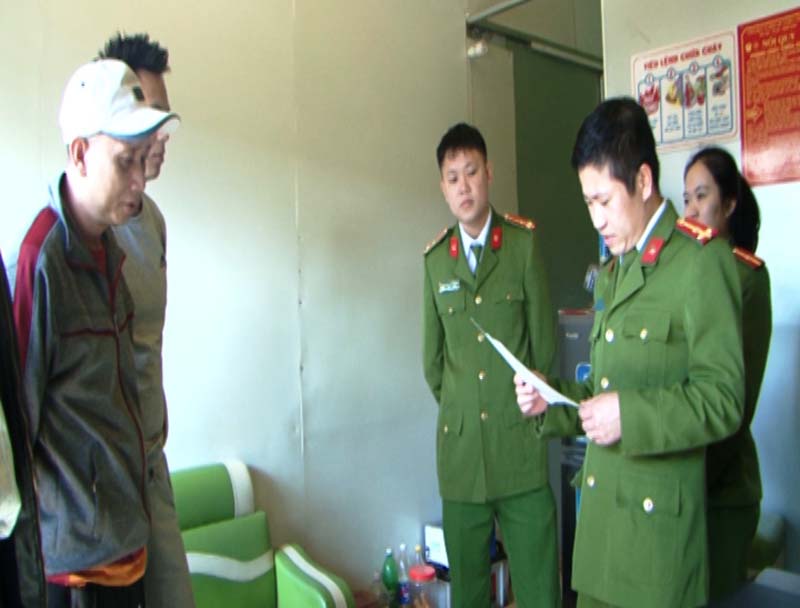
(HBO) – There are 1,153 business establishments subject to security and order conditions in Hoa Binh province. Of them, 106 establishments are pawnshop and 128 others are car and bike-rental service providers and financial consultants that pose potential risks of social disorder and legal violations.
An
investigator of Hoa Binh police reads a warrant of individuals who engaged in
"black credit” activities in Lac Son district.
"Black
credit” refers to a practice of borrowing from individuals at high interest
rates agreed on between borrower and lender, without collateral and with only
the borrower’s signature.
Black credits activities in the province are highly sophisticated and complicated,
are disguised in various forms, resulting in an increase in crimes like illegal
arrest and asset deterioration.
From April 2017 to December 2018, the provincial police received and handled 36
pawn service and "black credit” cases, including four illegal arrests, nine
intentionally causing injury cases, one asset extortion case, two asset
destruction cases, and eight moral threatening.
Local competent authority commenced criminal procedures against five cases
involving 15 people, busted two groups with 12 people for illegally capturing people
as part of their foreclosure measures.
According to Lieutenant Colonel Bui Duc Thinh, deputy head of Hoa Binh city
police, besides pawnshops, usury activities are now popular at many business
establishments that offer bike and car rental services and financial services.
The loan sharks hire a group of ruffians to create pressure on borrowers to pay
back the money, affecting the borrowers’ safety.
Most of the borrowers are those who lead a life of debaucher or are eager for
ill-gotten gains by borrowing for lending to enjoy interest rate differences.
Last year, the province had five intentionally causing injury cases and one
public order disturbance case./.
More than just an information technology teacher, Bui Van Nien is an inspiring figure who has nurtured the scientific curiosity and creative spirit of students in Vietnam’s ethnic minority communities.
Da Bac is the most disadvantaged mountainous district in Hoa Binh province, with ethnic minorities accounting for about 90% of its population. Over the past years, the district has mobilised resources to implement ethnic policies to improve the quality of life of local people.
In recent years, Hoa Binh province has consistently prioritised the protection, care, and education of children, particularly those from ethnic minorities and disadvantaged backgrounds, by creating a safe, healthy, and nurturing environment for their all-round development.
The Steering Committee for Tobacco Harm Prevention and Control of Hoa Binh province, in coordination with the Tobacco Harm Prevention and Control Fund, held a ceremony on May 28 in response to the World No Tobacco Day (May 31) and the National No Tobacco Week (from May 25 to 31). The event was chaired by Nguyen Van Toan, Standing Vice Chairman of the provincial People’s Committee and head of the Steering Committee.
Since 2021, the Center for Industrial Promotion and Industrial Development Consulting (CIIDC) under the Department of Industry and Trade has been implementing a school lighting model as part of the plan for using energy efficiently and economically in Hoa Binh Province in the pẻiod of 2021 - 2025. This model not only aims to improve the learning conditions and enhance the education quality, but it also promotes the message of energy saving, energy security, environmental protection and contributes to the goals of socio-economic development.
In the 2024 - 2025 school year, the entire Hoa Binh provincial education sector includes 520 educational institutions and schools. Among them are 13 ethnic boarding schools with 153 classes and 4,487 students. Four of these schools have met national standards, reaching 30.7 percent.



